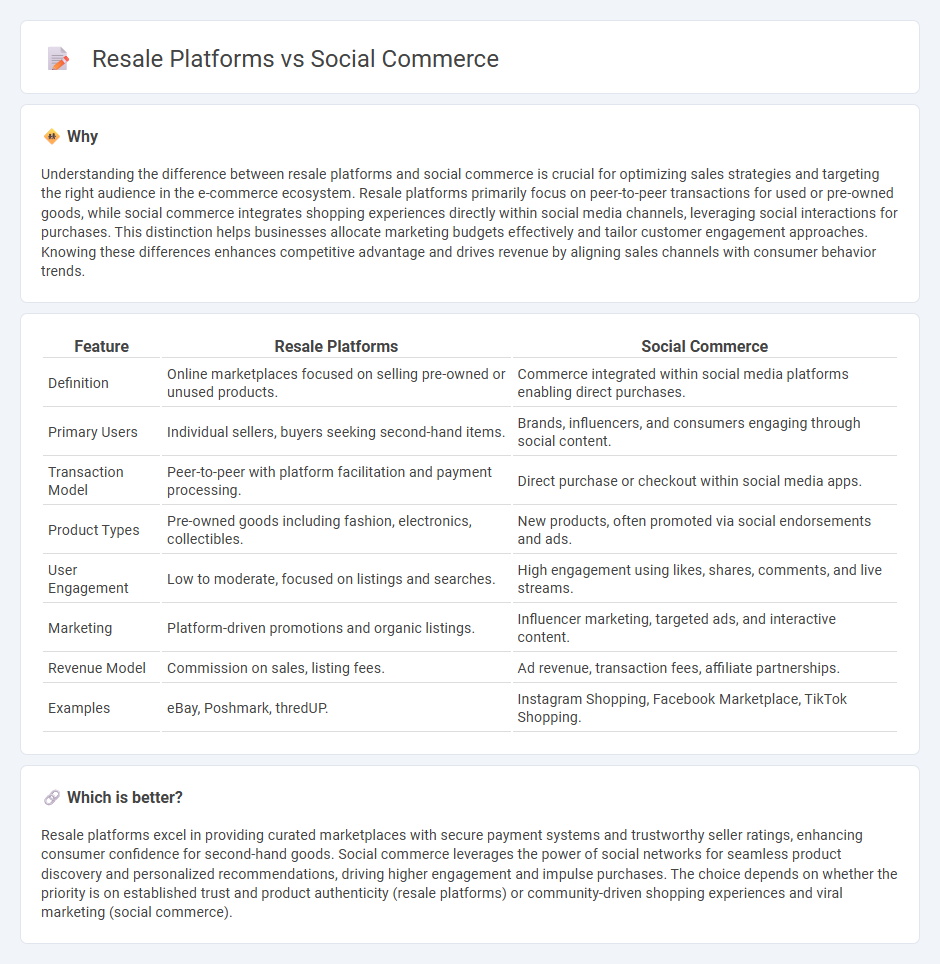
Resale platforms focus on enabling users to buy and sell pre-owned goods through dedicated online marketplaces, emphasizing sustainability and cost savings. Social commerce integrates shopping experiences directly within social media networks, leveraging user engagement and social interactions to drive purchases. Explore more to understand how these models shape the future of digital retail.
Why it is important
Understanding the difference between resale platforms and social commerce is crucial for optimizing sales strategies and targeting the right audience in the e-commerce ecosystem. Resale platforms primarily focus on peer-to-peer transactions for used or pre-owned goods, while social commerce integrates shopping experiences directly within social media channels, leveraging social interactions for purchases. This distinction helps businesses allocate marketing budgets effectively and tailor customer engagement approaches. Knowing these differences enhances competitive advantage and drives revenue by aligning sales channels with consumer behavior trends.
Comparison Table
| Feature | Resale Platforms | Social Commerce |
|---|---|---|
| Definition | Online marketplaces focused on selling pre-owned or unused products. | Commerce integrated within social media platforms enabling direct purchases. |
| Primary Users | Individual sellers, buyers seeking second-hand items. | Brands, influencers, and consumers engaging through social content. |
| Transaction Model | Peer-to-peer with platform facilitation and payment processing. | Direct purchase or checkout within social media apps. |
| Product Types | Pre-owned goods including fashion, electronics, collectibles. | New products, often promoted via social endorsements and ads. |
| User Engagement | Low to moderate, focused on listings and searches. | High engagement using likes, shares, comments, and live streams. |
| Marketing | Platform-driven promotions and organic listings. | Influencer marketing, targeted ads, and interactive content. |
| Revenue Model | Commission on sales, listing fees. | Ad revenue, transaction fees, affiliate partnerships. |
| Examples | eBay, Poshmark, thredUP. | Instagram Shopping, Facebook Marketplace, TikTok Shopping. |
Which is better?
Resale platforms excel in providing curated marketplaces with secure payment systems and trustworthy seller ratings, enhancing consumer confidence for second-hand goods. Social commerce leverages the power of social networks for seamless product discovery and personalized recommendations, driving higher engagement and impulse purchases. The choice depends on whether the priority is on established trust and product authenticity (resale platforms) or community-driven shopping experiences and viral marketing (social commerce).
Connection
Resale platforms and social commerce are interconnected through their use of user-generated content and peer-to-peer interactions that drive purchasing decisions. Social commerce leverages social networks to facilitate product discovery and trust, while resale platforms capitalize on these online communities to promote sustainable shopping and authentic secondhand goods. Both models enhance customer engagement and streamline transactions by integrating seamless social features with e-commerce functionalities.
Key Terms
User Engagement
Social commerce platforms enhance user engagement by integrating seamless shopping experiences within social media channels, leveraging features like live streaming and interactive content to boost real-time interaction and purchasing behavior. Resale platforms focus on community trust and user feedback systems to encourage repeat transactions and foster a sense of belonging among buyers and sellers. Explore the ways these platforms optimize user engagement to drive growth and customer loyalty.
Peer-to-Peer Transactions
Social commerce platforms enable peer-to-peer transactions by integrating social media features with e-commerce functionalities, enhancing user engagement and trust through direct interactions. Resale platforms primarily focus on facilitating secondhand item exchanges between individuals, emphasizing convenience and accessibility in peer-to-peer sales. Explore more about how these platforms reshape the digital marketplace and empower individual sellers.
Community Trust
Social commerce platforms leverage interactive features and user-generated content to build community trust, fostering direct engagement between buyers and sellers. Resale platforms emphasize product authenticity and secure transactions, relying on verified user reviews and seller ratings to maintain credibility. Explore how community trust shapes the evolution of these marketplaces for deeper insights.
Source and External Links
Social commerce - Wikipedia - Social commerce is the use of social networks in e-commerce transactions, enabling customers to browse and complete purchases without leaving social media platforms.
Social Commerce Examples: 14 Real-Life Success Stories and Insights - Social commerce integrates shopping and social engagement through in-app purchasing, influencer collaborations, and shoppable posts, creating seamless buying experiences directly inside social media that are projected to reach $80 billion by 2025.
What is social commerce? - TechTarget - Social commerce leverages social media platforms like Facebook, TikTok, and Instagram to facilitate buying and selling using native shopping features, targeted ads, and customer data to create personalized, direct-to-consumer purchasing experiences.
 dowidth.com
dowidth.com